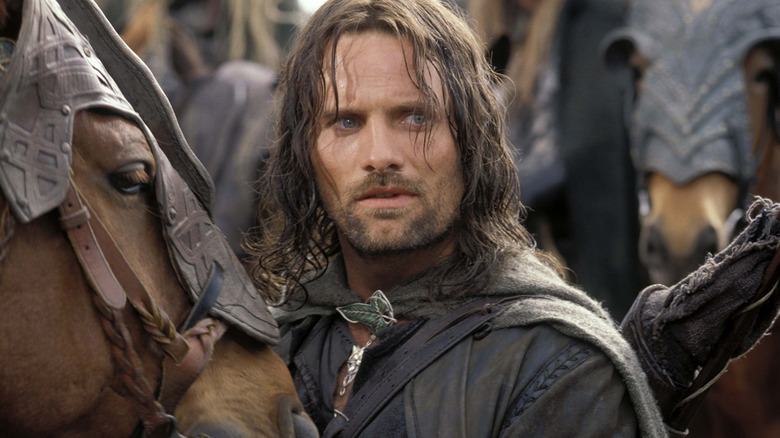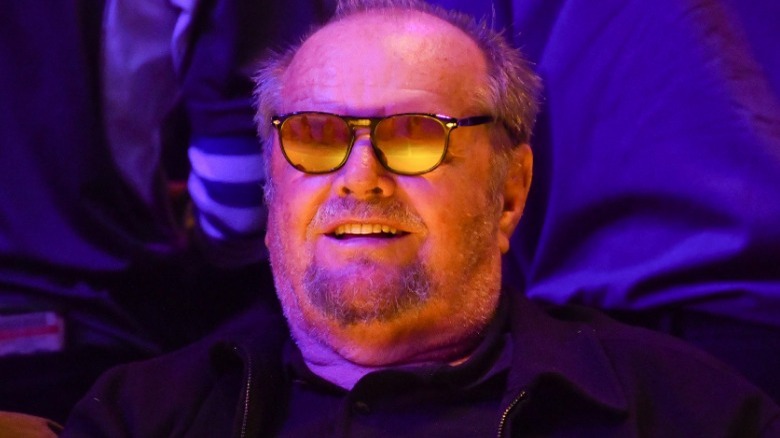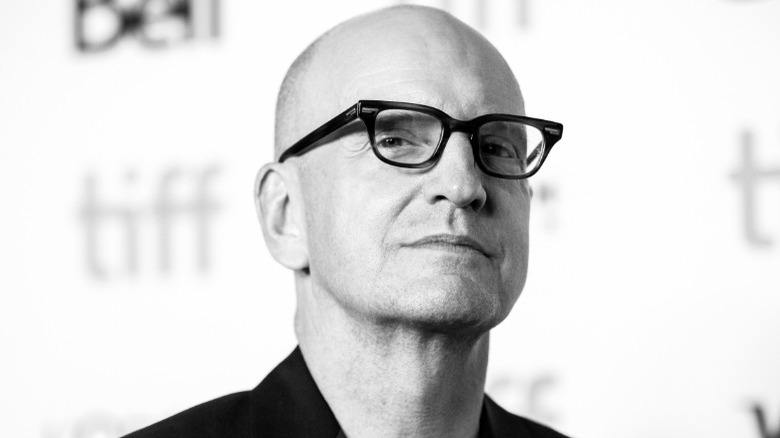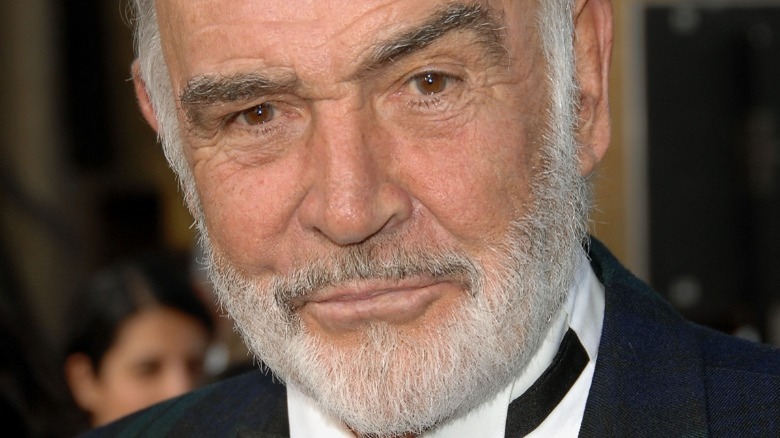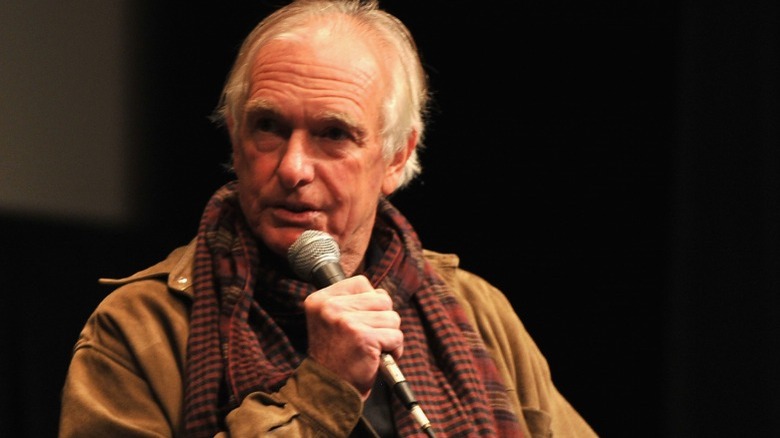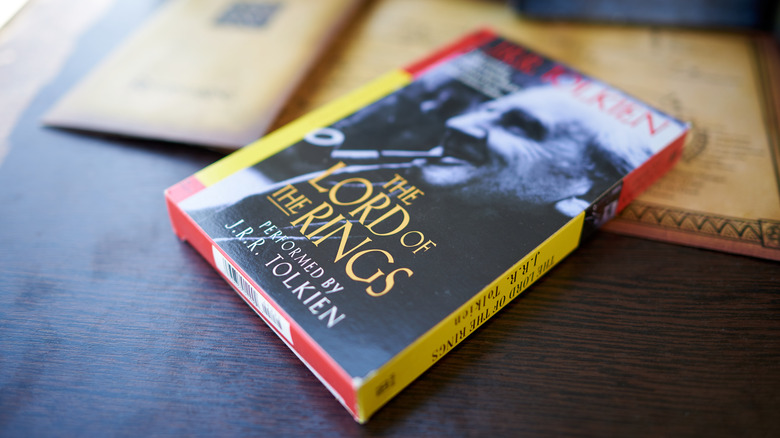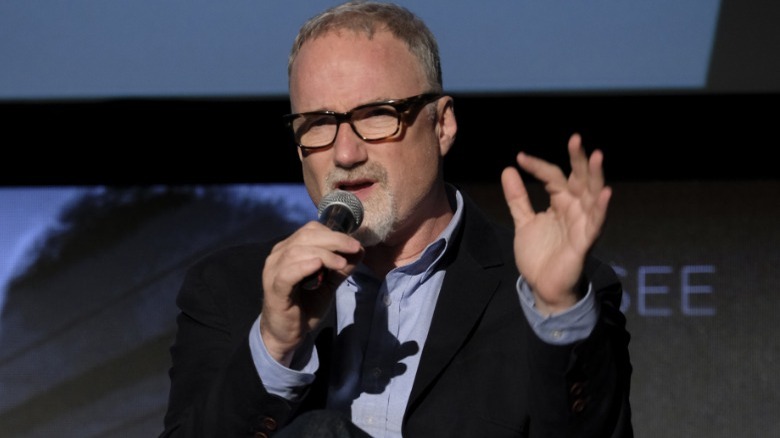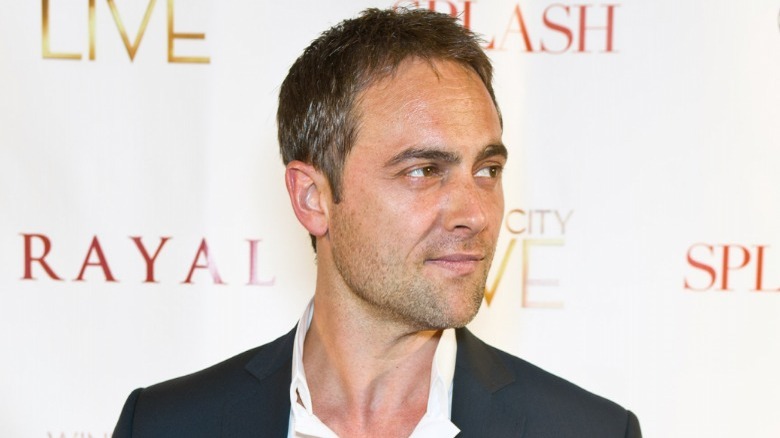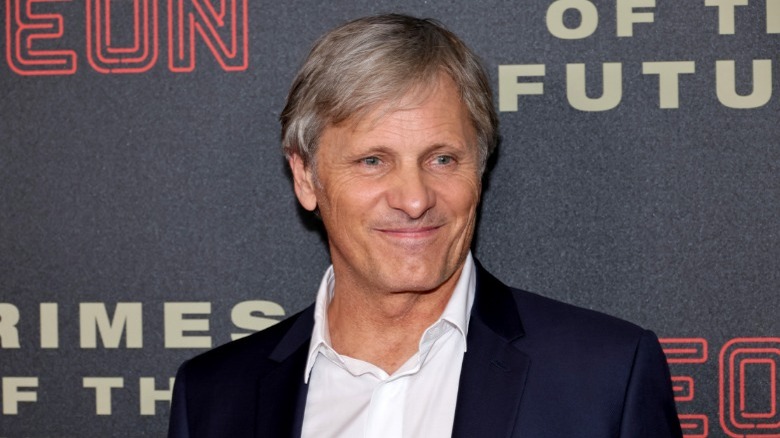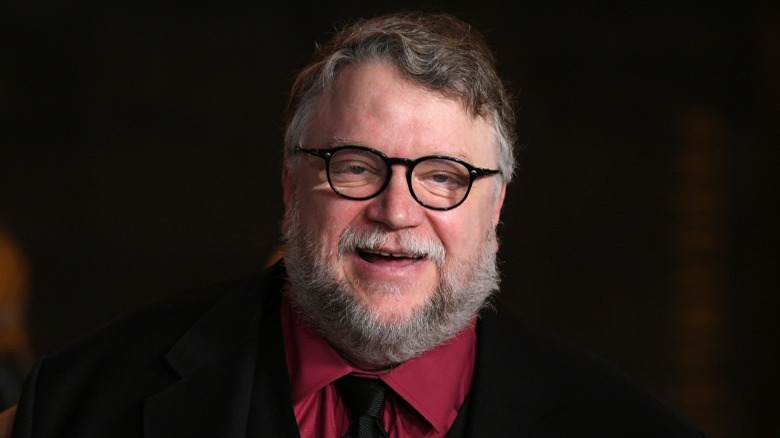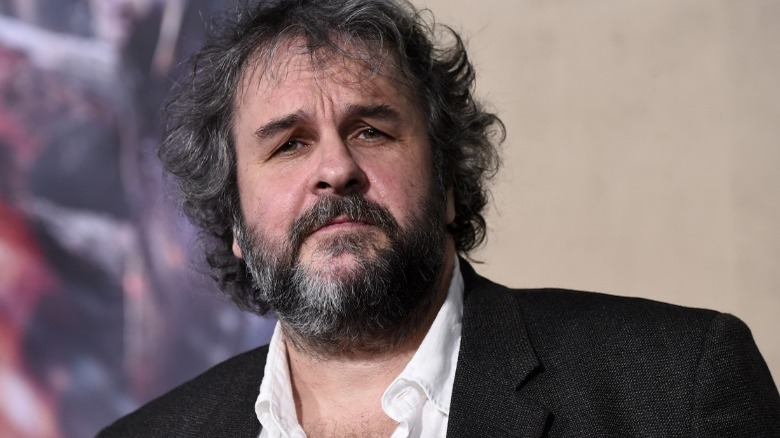Actors And Filmmakers Who Hated The Lord Of The Rings Universe
Who doesn't love the three movies collectively known as "The Lord of the Rings"? Many readers consider the films to be among the best book adaptations ever. Peter Jackson's beloved trilogy has an expansive fan base, as evidenced by the billions of dollars it made at the box office and the 17 Academy Awards it has taken home. You would think that nobody has ever had an unkind word to say about the movies.
Yet despite all this, "The Lord of the Rings" is not universally loved. Several actors and filmmakers have criticized the trilogy. Some have openly expressed their distaste for the movies, including one veteran actor who admitted (at an award ceremony, no less) that he walked out of the theater while watching "The Return of the King." Others may not have criticized "The Lord of the Rings" directly but have shown their frustration at how it changed the film industry. A few of the movie's most outspoken critics were actually involved in the movie's production. You might be surprised to learn who hates (or at least has lukewarm feelings for) "The Lord of the Rings."
Jack Nicholson never watched the end of The Return of the King
Arguably, no celebrity was more candid about their distaste for "The Lord of the Rings" than Jack Nicholson, who had no qualms about criticizing the movie to its lead actor's face.
Elijah Wood shared this shocking anecdote on The Graham Norton Show. Wood said he had been backstage with Nicholson at the Golden Globes. As Wood recalled, he and Nicholson were discussing the final film in the "Lord of the Rings" trilogy and Nicholson asked him, "What happened?" Wood wasn't sure what he meant, until Nicholson said, "Well, tell me what the end was." Nicholson openly admitted to Wood that he tried to get through "The Return of the King" but walked out of the movie theater before the movie was even over. According to Wood, Nicholson told him, "It just had so many endings ... It just wouldn't end."
Nicholson had a bit of a point. The falling action in the film's extended edition runs for 27 minutes with six separate sequences, each of which could have made a fine ending in its own right. However, Nicholson's judgment may have been a little bit harsh, since those 27 minutes needed to wrap up an entire trilogy. "The Lord of the Rings" screenwriter Philippa Boyens defended the film's ending in an interview at New York Comic Con (via Yahoo Entertainment). "Can I just for the record say, 'I don't give a s***'?" said Boyens. "We weren't ending one film; we were ending three films."
Steven Soderbergh was also frustrated by 'a lot of endings'
Jack Nicholson wasn't the only one bothered by the film's ending. When asked to describe ways the film industry had changed since the late 20th century and which changes he was wary of, director Steven Soderbergh admitted that Peter Jackson's beloved trilogy came to mind. "The thing I also see a lot of is multiple endings," he told Vulture. "I feel like movies end like five times now! I remember being very conscious of the 'Lord of the Rings' movies having a lot of endings." Soderbergh may not have been as blunt as Nicholson, but clearly he fell into the same school of thought.
In the same interview, the director said, "I wonder if the audience has come to expect [multiple endings]." Perhaps after "The Lord of the Rings," this trope was accepted as normal. However, Soderbergh didn't think that was necessarily a good thing. If anything, he was worried that 21st century audiences were growing less tolerant of films that take risks.
Speaking of his film "Contagion," Soderbegh said, "I remember during previews how upset the audience was by the Jude Law character." The reaction, according to Soderbergh, was not "Oh, that's interesting, I'm not sure if this guy is an a**hole or a hero." Instead, the character's moral ambiguity frustrated audiences. This left Soderbergh thinking, "Wow, so ambiguity is not on the table anymore." It therefore seems like the clearly-defined moral compass in "The Lord of the Rings" wouldn't appeal to Soderbergh.
Sean Connery didn't want to play Gandalf
There are a lot of actors who turned down roles in "The Lord of the Rings," but most of them simply declined because of scheduling conflicts or because they weren't prepared for the time commitment. Only one notable actor passed on this opportunity because he didn't care for the story.
Sean Connery was one of the actors considered for the role of Gandalf, before Peter Jackson chose Ian McKellen. Ultimately, Jackson decided that Connery wasn't right for the role because too many people would recognize the actor's famous face. "I felt Gandalf would take on a Sean Connery persona," Jackson told The Scotsman. In any event, Connery had no interest in donning Gandalf's robes. According to The Scotsman, the actor said, "I never understood it. I read the book, I read the script, I saw the movie. I still don't understand it." He added, "I would be interested in doing something that I don't fully understand, but not for 18 months."
Oh well. His loss. Aside from missing a chance to participate in a huge cultural phenomenon, Connery also turned down a fortune. Since Sean Connery was such a big name, New Line Cinema had been prepared to offer the actor 10-15% of the international box office profits, which would have amounted to over $150 million. Had Connery played Gandalf, his earnings probably would have set the record for the most money an actor made from a single role.
Peter Weir blames The Lord of the Rings for the rise of the blockbuster
Presumably, director Peter Weir has no problem with the "Lord of the Rings" movies themselves. However, he is definitely wary of their success and the way they permanently transformed the movie industry.
In an interview with Cinemablend, Weir said that before "The Lord of the Rings," no movie had ever attained that degree of financial and cultural success aside from "Titanic." But Weir argued that "Titanic" had been considered a fluke at the time and nobody expected it to happen again. That is, until Peter Jackson released three huge hits in a row, and suddenly Hollywood was hungry for film franchises. "'Lord of the Rings' showed that there was gold in them thar hills ... if you could get one of these franchises to make billions," said Weir. After that, he added, studio executives weren't interested in original films that could still be profitable at a smaller level. As a result, it became nearly impossible for Weir to get backing for his independent film "The Way Back."
It's possible his sentiments were influenced by the fact that Peter Jackson's Oscar sweep in 2004 claimed trophies that might have gone to Weir's own film, "Master and Commander: The Far Side of the World." More likely, though, Weir was mourning for all the independent filmmakers who lost an opportunity to get their films produced because studios were too busy hunting for the next "The Lord of the Rings."
Christopher Tolkien felt the movies 'gutted the book'
Christopher Tolkien, son of J.R.R. Tolkien, was neither an actor nor a filmmaker, but he is still worth mentioning for his vocal criticism of the "Lord of the Rings" movies. Tolkein's son expressed his distaste for Peter Jackson's films to the French journal Le Monde (via Cinemablend), saying, "They gutted the book, making an action movie for 15-25 year-olds." He added that the films made "The Lord of the Rings" immensely popular but may have lost something in the process. "The gap widened between the beauty, the seriousness of the work, and what it has become is beyond me," he said. "This level of marketing reduces to nothing the aesthetic and philosophical significance of this work."
To be fair, Christopher Tolkien, who died in 2020 at the age of 95, also admitted that he thought it would have been nearly impossible to create a movie that did the books justice, simply because some stories don't translate well from book to film. "'The Lord Of The Rings' is peculiarly unsuitable to transformation into visual dramatic form," Tolkien's son told Entertainment Weekly in 2001.
David Fincher is skeptical of releasing extended cuts like Peter Jackson
Director David Fincher never explicitly voiced an opinion on the "Lord of the Rings" trilogy. However, judging by one interview from Collider, he doesn't seem to be a fan of Peter Jackson's extended cuts.
When Collider asked Fincher if he would ever release any extended cuts of his films, the director said he saw no need to do so. Fincher believed that filmmakers should make sure the theatrical version is the best possible version of the movie. "I'm a final cut director," he said. He added that whenever he cuts a scene, he usually cuts it for a good reason. Speaking of his film "The Girl with the Dragon Tattoo," Fincher explained, "I took out stuff that I didn't think was as good as the other stuff," as well as anything that interrupted the movie's pacing.
Asked how he felt about the extended edition of "The Lord of the Rings," Fincher replied, "I've never seen them, the extended versions." However, it wouldn't be a stretch to surmise that, if Fincher did watch the extended editions, he would feel the same way he feels about any extended cut — that they're completely unnecessary. "I don't believe in that," he told Collider. It's unclear how Fincher feels about the theatrical versions of Peter Jackson's movies.
Stuart Townsend was relieved he didn't work on the films
Before Viggo Mortensen was cast to play Aragorn, Peter Jackson had somebody different in mind. Originally, Stuart Townsend was supposed to play the heir of Isildur. In fact, he spent two months on the set before he was fired and replaced by Mortensen.
Townsend insists that he got a raw deal, alleging that Jackson and his crew criticized his work ethic. "They fired me before filming even started because they said I wasn't working hard enough, which is totally ridiculous," he told The Independent. In an Entertainment Weekly interview, however, Townsend said that the filmmakers decided that Aragorn needed to be played by someone older. He explained, "The director [Peter Jackson] wanted me and then apparently thought better of it because he really wanted someone 20 years older than me and completely different."
The actor added that he didn't have a positive experience with the crew and was glad to exit, except for the fact that the filmmakers refused to pay him for his time. "I have no good feelings for those people in charge," said Townsend, adding that it was probably best that he wasn't involved in the project. Townsend also told The Independent that he never watched the "Lord of the Rings" movies, suggesting he has the same opinion toward them as he does Peter Jackson.
Viggo Mortensen felt the two sequels lacked nuance
It may surprise you to learn that an actor from "The Lord of the Rings" was not afraid to criticize the trilogy. Viggo Mortensen believes that the first movie was the best one, insisting that the second and third films were a bit indulgent with special effects. He told The Telegraph, "In the first movie, yes, there's Rivendell, and Mordor, but there's sort of an organic quality to it, actors acting with each other, and real landscapes; it's grittier." For the first movie, Peter Jackson was still exploring CGI technology, so he didn't rely on it as much, according to Mortensen. After that, however, Jackson used CGI at every opportunity. With that increase in CGI came a decrease in subtlety, argued Mortensen: "Whatever was subtle ... in the first movie, gradually got lost in the second and third." (And don't even get him started about the "Hobbit" trilogy.)
In a later interview, Mortensen shared his frustration that fans accused him of hating the entire "Lord of the Rings" trilogy just because of one small remark. "I didn't say [Peter] had ruined anything," he told The Independent. "It's just an opinion." Still, he remained firm on his position about the CGI. "I personally like the extended version of the first movie because it was less computer generated, had more scenes one-on-one." Mortensen added that he was grateful that these movies opened a lot of doors for him in the film world.
Guillermo del Toro admits he never finished reading the book
Guillermo del Toro, director of the dark fantasy "Pan's Labyrinth," has admitted that he never got into Tolkien's brand of high fantasy. When asked by Salon in 2006 if he was influenced by Tolkien, del Toro said, "I was never into heroic fantasy. At all. I don't like little guys and dragons, hairy feet, hobbits — I've never been into that at all. I don't like sword and sorcery, I hate all that stuff." Meanwhile, the director admitted to Entertainment Weekly that he never actually finished reading "The Lord of the Rings." "I tried my best to read ... the trilogy," he said. "I could not. They were very dense." (He did, however, love reading "The Hobbit.")
Yet in an ironic twist of fate, del Toro was briefly set to direct the adaptation of "The Hobbit," prompting some to wonder why on Middle-earth the director would agree to that. Knowing what del Toro had previously said, and that the films would require a huge time commitment, this decision seemed like a mistake to many audiences.
Guillermo del Toro's films are amazing in their own right. However, asking him to change his style to match Tolkien or Peter Jackson would be like asking Taikia Waititi to direct a moody superhero movie in the vein of "The Batman" instead of funny and subversive films like "Thor: Ragnarok." It wouldn't have played to his strengths. So maybe it's for the best that del Toro left the project.
Peter Jackson almost wishes he could forget making the films
Peter Jackson doesn't hate the "Lord of the Rings" movies, not by a long shot. Obviously he loves them, since he spent years trying to bring them to the screen. But the director almost wishes he could forget how he made them. He loves the trilogy so much that he would like to experience the films like an audience member who wants to know what happens next, instead of as a director who knows every shot by heart.
Peter Jackson admitted to the Awards Chatter podcast (via The Guardian) that he was a little bit jealous of fans who saw "The Lord of the Rings" in theaters for the first time, not knowing what lay in store — so jealous, in fact, that he wondered if it was possible to erase his memories of the production. Jackson explained, "I actually did seriously consider going to a ... hypnotherapy guy to hypnotise me, to make me forget about the films and forget about the work I'd done over the last six or seven years, so at least I could sit and enjoy them." Fortunately for Peter Jackson fans, the director didn't get a mind wipe.
Luckily, there is one part of the "Lord of the Rings" universe that Peter Jackson gets to appreciate as just a fan. Jackson shared in the same podcast that he planned to watch Amazon's "Rings of Power" series, saying, "The one thing I am looking forward to is actually seeing it as a perfectly neutral viewer."
